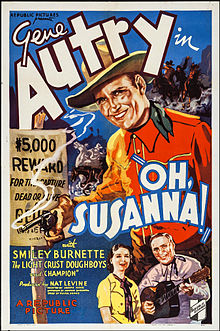
Lester Alvin Burnett, better known as Smiley Burnette, was an American country music performer and a comedic actor in Western films and on radio and TV, playing sidekick to Gene Autry, Roy Rogers, and other B-movie cowboys. He was also a prolific singer-songwriter who is reported to have played proficiently over 100 musical instruments, sometimes more than one simultaneously. His career, beginning in 1934, spanned four decades, including a regular role on CBS-TV's Petticoat Junction in the 1960s.

Tumbling Tumbleweeds is a 1935 American Western film directed by Joseph Kane and starring Gene Autry, Smiley Burnette, and Lucile Browne. Written by Ford Beebe, the film is about a cowboy who returns home after a five-year absence to find his father murdered and his boyhood pal accused of the dastardly deed. Tumbling Tumbleweeds features the songs "Riding Down the Canyon", "That Silver-Haired Daddy of Mine", and the Bob Nolan classic "Tumbling Tumbleweeds".
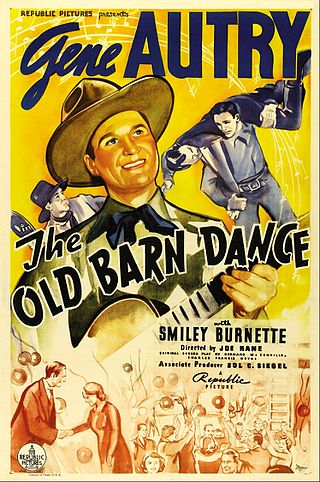
The Old Barn Dance is a 1938 American Western film directed by Joseph Kane and starring Gene Autry, Smiley Burnette, Joan Valerie, and written by Bernard McConville and Charles F. Royal.

The Big Show is a 1936 American Western musical film directed by Mack V. Wright and starring Gene Autry, Kay Hughes, and Smiley Burnette. Written by Dorrell and Stuart E. McGowan, the film is about a singing cowboy who confuses two girls by being himself and his own stunt double at the Texas Centennial in Dallas. Roy Rogers appears in the film as one of the Sons of the Pioneers.

Springtime in the Rockies is a 1937 American Western film directed by Joseph Kane and starring Gene Autry, Smiley Burnette, and Polly Rowles. Written by Gilbert Wright and Betty Burbridge, the film is about a ranch owner who brings a flock of sheep into cattle country and faces the opposition of local ranchers with the help of her ranch foreman.

Public Cowboy No. 1 is a 1937 American Western film directed by Joseph Kane and starring Gene Autry, Smiley Burnette, and Ann Rutherford. Based on a story by Bernard McConville, the film is about a singing cowboy who chases down rustlers who are using airplanes, shortwave radios, and refrigerated trucks to steal cattle.
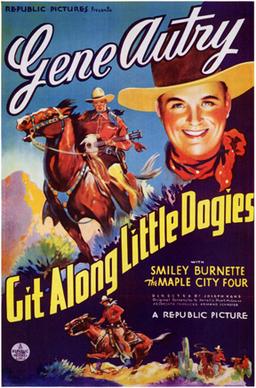
Git Along Little Dogies is a 1937 American Western film directed by Joseph Kane and starring Gene Autry, Smiley Burnette, and the Maple City Four. Written by Dorrell and Stuart E. McGowan, the film is about a singing cowboy who gets caught up in a war between oilmen and cattle ranchers, taking the side of the ranchers until he learns that oil will bring a railroad to town. The film is also known as Serenade of the West in the United Kingdom.
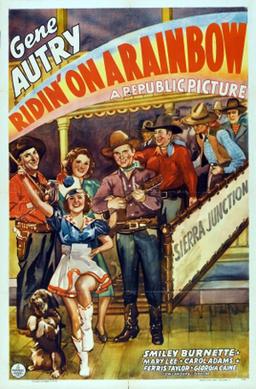
Ridin' on a Rainbow is a 1941 American western musical film directed by Lew Landers and starring Gene Autry, Smiley Burnette and Mary Lee. Written by Bradford Ropes and Doris Malloy, based on a story by Ropes, the film is about a singing cowboy whose investigation of a bank robbery takes him to a showboat, where he finds that a teenage singer's father has been working with the robbers to provide for her future. The film received an Academy Award nomination for best original song for "Be Honest with Me".

Home on the Prairie is a 1939 American Western film directed by Jack Townley and starring Gene Autry, Smiley Burnette, and June Storey. Written by Charles Arthur Powell and Paul Franklin, the film is about a cattle inspector's efforts to prevent a corrupt cattle rancher from shipping to market a herd of cattle infected with hoof and mouth disease.

The Singing Cowboy is a 1936 American Western film directed by Mack V. Wright and starring Gene Autry, Smiley Burnette, Lois Wilde and Lon Chaney Jr. Based on a story by Tom Gibson, the film is about a cowboy who decides to sing on television in order to raise money for the orphaned daughter of his former boss who was murdered.
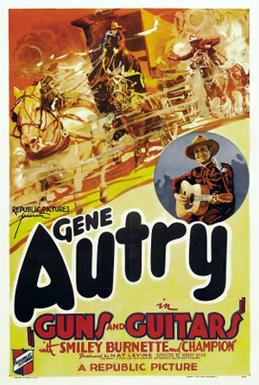
Guns and Guitars is a 1936 American Western film directed by Joseph Kane and starring Gene Autry, Smiley Burnette, and Dorothy Dix in her final film appearance. Written by Dorrell and Stuart E. McGowan, the film is about a singing cowboy who helps protect a county from fever-ridden cattle, and after being framed for murdering the sheriff, proves his innocence, gets elected sheriff, and then goes after the bad guy.
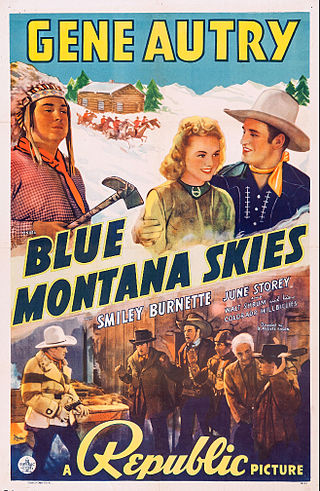
Blue Montana Skies is a 1939 American Western film directed by B. Reeves Eason and starring Gene Autry, Smiley Burnette, and June Storey. Based on a story by Norman S. Hall and Paul Franklin, the film is about a singing cowboy who goes up against a gang of fur smugglers operating near the Canada–United States border.

Mountain Rhythm is a 1939 American Western film directed by B. Reeves Eason and starring Gene Autry, Smiley Burnette, and June Storey. Based on a story by Connie Lee, the film is about a cowboy who organizes his fellow ranchers to oppose an Eastern promoter's land grab scheme.

Colorado Sunset is a 1939 American Western film directed by George Sherman and starring Gene Autry, Smiley Burnette, and June Storey. Written by Betty Burbridge and Stanley Roberts, based on a story by Luci Ward and Jack Natteford, the film is about a singing cowboy and his buddies who discover that the ranch they bought is really a dairy farm—and worse, it's subject to intimidation from a protection racket that prevents dairy products from safely reaching the market.
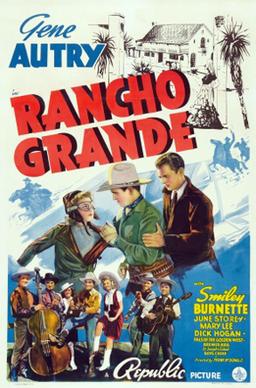
Rancho Grande is a 1940 American Western film directed by Frank McDonald and starring Gene Autry, Smiley Burnette, and June Storey. Written by Bradford Ropes, Betty Burbridge, and Peter Milne, based on a story by Peter Milne and Connie Lee, the film is about a singing cowboy and ranch foreman responsible for completing an important irrigation project and for the three spoiled grandchildren of his former boss who come out West to the ranch they inherited.
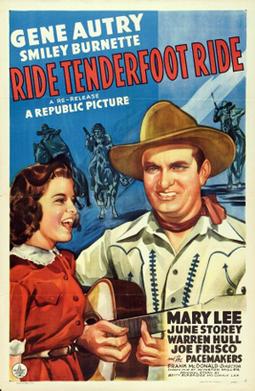
Ride, Tenderfoot, Ride is a 1940 American Western film directed by Frank McDonald and starring Gene Autry, Smiley Burnette, and June Storey. Written by Winston Miller, based on a story by Betty Burbridge and Connie Lee, the film is about a singing cowboy who inherits a meat-packing plant and must face stiff competition from a beautiful business rival.

Carolina Moon is a 1940 American Western film directed by Frank McDonald and starring Gene Autry, Smiley Burnette, and June Storey. Based on a story by Connie Lee, the film is about a singing cowboy who comes to the aid of plantation owners who are being robbed of their land by a scheming lumber company.
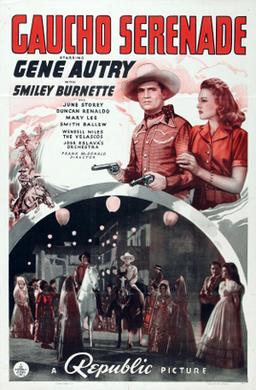
Gaucho Serenade is a 1940 American Western film directed by Frank McDonald and starring Gene Autry, Smiley Burnette, and June Storey. Written by Betty Burbridge and Bradford Ropes, the film is about a singing cowboy who goes up against a group of businessmen who plot to kidnap the son of a former partner so he won't testify against them.
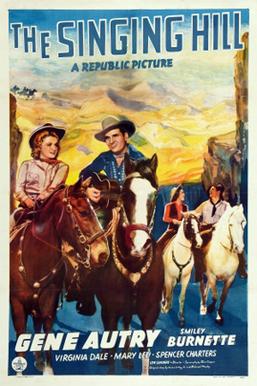
The Singing Hill is a 1941 American western film directed by Lew Landers and starring Gene Autry, Smiley Burnette, and Virginia Dale. Based on a story by Jesse Lasky Jr. and Richard Murphy, the film is about a singing cowboy and foreman of a ranch that may be sold to an unscrupulous banker by the young madcap heiress who is unaware that the sale will result in the local ranchers losing their free grazing land and their ranches. In the film, Autry performed the 1940 song "Blueberry Hill", first recorded by Sammy Kaye, which would become a standard recorded by such artists as Louis Armstrong (1949), Fats Domino (1956), and Elvis Presley (1957). The song became one of Autry's best-selling recordings. In 1987, "Blueberry Hill" received an ASCAP Award for Most Performed Feature Film Standards on TV.

Sierra Sue is a 1941 American western film directed by William Morgan and starring Gene Autry, Smiley Burnette, and Fay McKenzie. Written by Earl Felton and Julian Zimet, the film is about a government inspector investigating a poisonous weed that is destroying the rangeland supporting the area's cattle. The inspector must persuade the ranchers to reject a plan to burn the land and support a new process of chemical spraying from an airplane. The film features the popular Autry songs "Be Honest With Me", "Ridin' the Range", and the title track.
